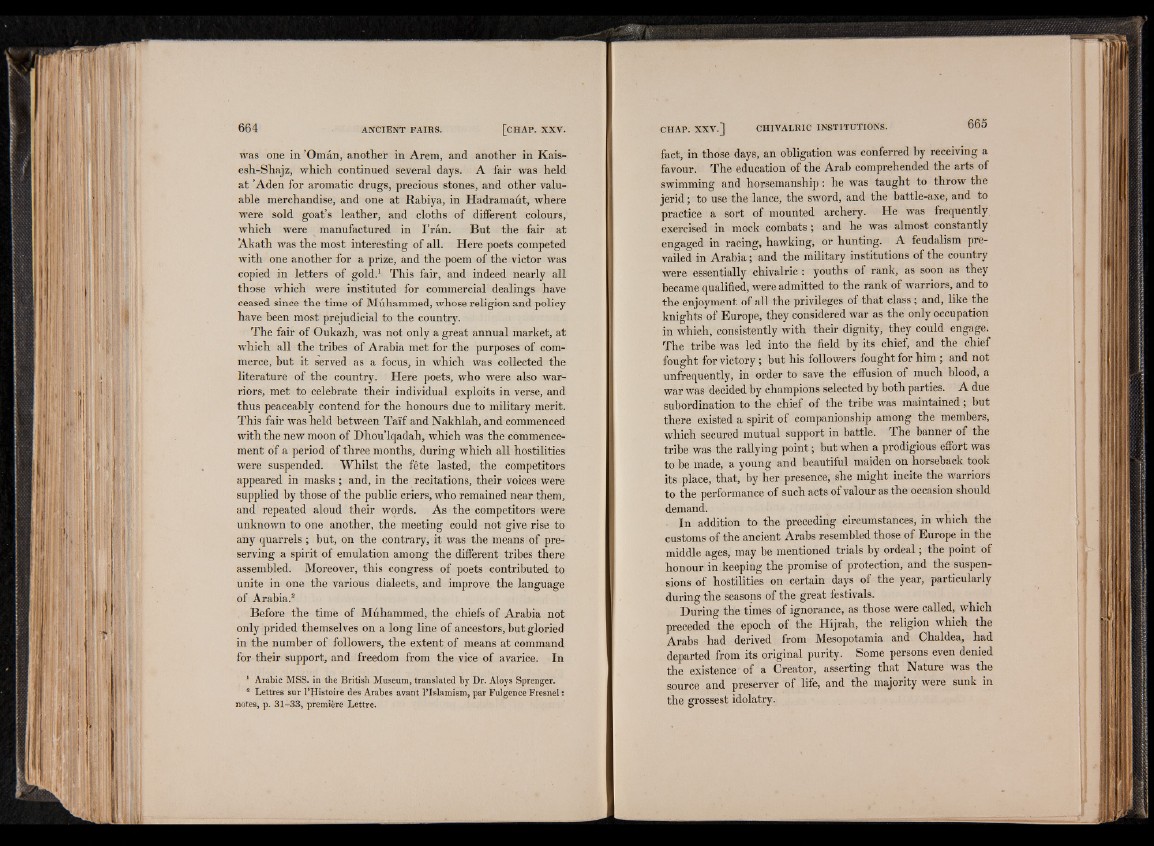
was one in ’Omán, another in Arem, and another in Kais-
esh-Shajz, which continued several days. A fair was held
at ’Aden for aromatic drugs, precious stones, and other valuable
merchandise, and one at Rabiya, in Hadramaút, where
were sold goat’s leather, and cloths of different colours,
which were manufactured in I’rán. But the fair at
Akath was the most interesting of all. Here poets competed
with one another for a prize, and the poem of the victor was
copied in letters of gold.1 This fair, and indeed nearly all
those which were instituted for commercial dealings have
ceased since the time of Múhammed, whose religion and policy
have been most prejudicial to the country.
The fair of Oukazh, was not only a great annual market, at
which all the tribes of Arabia met for the purposes of commerce,
but it served as a focus, in which was collected the
literature of the country. Here poets, who were also warriors,
met to celebrate their individual exploits in verse, and
thus peaceably contend for the honours due to military merit.
This fair was held between Taïf and Nakhlah, and commenced
with the new moon of Dhou’lqadah, which was the commencement
of a period of three months, during which all hostilities
were suspended. Whilst the fête lasted, the competitors
appeared in masks ; and, in the recitations, their voices were
supplied by those of the public criers, who remained near them,
and repeated aloud their words. As the competitors were
unknown to one another, the meeting could not give rise to
any quarrels ; but, on the contrary, it was the means of preserving
a spirit of emulation among the different tribes there
assembled. Moreover, this congress of poets contributed to
unite in one the various dialects, and improve the language
of Arabia.2
Before the time of Múhammed, the chiefs of Arabia not
only prided themselves on a long line of ancestors, but gloried
in the number of followers, the extent of means at command
for their support, and freedom from the vice of avarice. In
1 Arabic MSS. in the British Museum, translated by Dr. Aloys Sprenger.
s Lettres sur l’Histoire des Arabes avant l ’Islamism, par Fulgence Fresnel :
notes, p. 31-33, première Lettre.
fact, in those days, an obligation was conferred by receiving a
favour. The education of the Arab comprehended the arts of
swimming and horsemanship: he was taught to throw the
jerid; to use the lance, the sword, and the battle-axe, and to
practice a sort of mounted archery. He was frequently
exercised in mock combats) and he was almost constantly
engaged in racing, hawking, or hunting. A feudalism prevailed
in Arabia; and the military institutions of the country
were essentially chivalric: youths of rank, as soon as they
became qualified, were admitted to the rank of warriors, and to
the enjoyment of all the privileges of that class; and, like the
knights of Europe, they considered war as the only occupation
in which, consistently with their dignity, they could engage.
The tribe was led into the field by its chief, and the chief
fought for victory; but his followers fought for him ; and not
unfrequently, in order to save the effusion of much blood, a
war was decided by champions selected by both parties. A due
subordination to the chief of the tribe was maintained; but
there existed a spirit of companionship among the members,
which secured mutual support in battle. The banner of the
tribe was the rallying point; but when a prodigious effort was
to be made, a young and beautiful maiden on horseback took
its place, that, by her presence, she might incite the warriors
to the performance of such acts of valour as the occasion should
demand.
In addition to the preceding circumstances, in which the
customs of the ancient Arabs resembled those of Europe in the
middle ages, may be mentioned trials by ordeal; the point of
honour in keeping the promise of protection, and the suspensions
of hostilities on certain days of the year, particularly
during the seasons of the great festivals.
During the times of ignorance, as those were called, which
preceded the epoch of the Hijrah, the religion which the
Arabs had derived from Mesopotamia and Chaldea, had
departed from its original purity. Some persons even denied
the existence' of a Creator, asserting that Nature was the
source and preserver of life, and the majority were sunk in
the grossest idolatry.